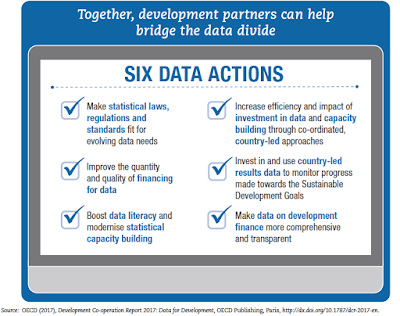A few reflections on the new OECD flagship report on Data for Development

I just read through the first 135 pages of the recently released 320 page OECD Development Co-operation Report 2017-Data for Development . The first part Making data for development is followed by detailed profiles of all the members of the organization’s Development Assistance Committee (DAC) which I am skipping for the moment. Besides a general discussion about the value of annual ‘flagship reports’, the document is an important artifact to learn more about the consensus that an organization like the OECD presents when it comes to a topic like data for development. The report is visually appealing, chapters are well referenced with contemporary literature and most of them provide good summaries of the topic. And the overarching message that good data systems to achieve the SDGs are important and often lacking is a necessary reminder for the OECD-DAC community. But as a researcher and teacher I am also interested in approaching such a substantial document with a critical, perha

